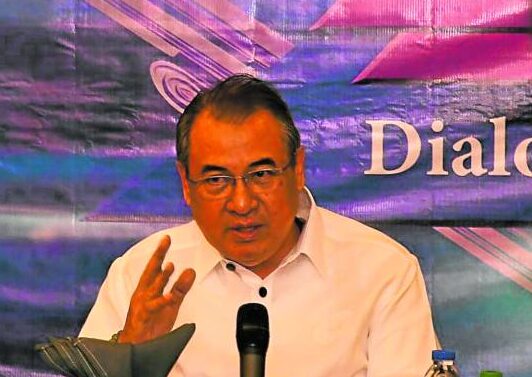
Supreme Court Chief Justice Alexander Gesmundo. INQUIRER PHOTO
Anyone on social media can provide news and influence opinion. But for Supreme Court Chief Justice Alexander Gesmundo, only trained media professionals with high ethical standards and credibility can be called “true practitioners.” Gesmundo shared his thoughts on the evolving media landscape marked by the rise of social media bloggers, vloggers, influencers and content creators, during a dialogue on Wednesday with journalists covering the Supreme Court, the Department of Justice and other courts.
“Only our professionals, who have been inculcated with the high standards of ethics and accountability, can truly practice and represent our professions with credibility,” he said of the role of journalists in the digital age.
Real purpose
Addressing the reporters at what served as the year-end press briefing of the Supreme Court, Gesmundo noted how “the digital age has altered the landscape of our professions” such that “news reporting, once the domain only of professionals, has been explored into by all and sundry.”
“Almost everyone now with a camera and social media account can deliver news and entertainment,” he said.
This may be a good development for spreading public awareness and information, Gesmundo said, but he also wondered “if this truly reflects the real purpose of media as a tool for democracy.”
He stressed that “only the ethics of the profession imposes upon true practitioners” the responsibility of being truthful and providing the proper context of the reported development or information.
Gesmundo said the media had continued to keep people informed while bridging communities and bringing institutions closer to the people “even as we have aged and as the world has rapidly progressed.”
False info from social media
“It is this function that we have appealed to and for this we thank the media for all its support,” the chief justice said as he underscored how the press had helped in spreading awareness of the tribunal’s reform agenda.
In a recent Pulse Asia survey on the proliferation of fake news, over half of the respondents said most of the false information about government and politics had come from social media influencers, bloggers and vloggers.
The poll, whose results were released in October, showed that 69 percent of the respondents from the National Capital Region, 67 percent from Balance Luzon, 47 percent from the Visayas, and 43 percent from Mindanao consider bloggers and vloggers on social media to be their top source of misinformation.
“Social media influencers, bloggers, and/or vloggers are seen by most Filipino adults (58 percent) as peddlers of fake news about government and politics. For a small majority of adults (58 percent), social media influencers, bloggers and/or vloggers are responsible for spreading fake political news in the country—an opinion shared by most Metro Manilans (69 percent), those in the rest of Luzon (67 percent), and those belonging to Class ABC and D (69 percent and 58 percent, respectively),” Pulse Asia said.
On Badoy’s posts
In October, the Supreme Court asked Lorraine Badoy, the former spokesperson for the National Task Force to End Local Armed Conflict, to explain why she should not be cited for indirect contempt over her statements on social media criticizing Judge Marlo Magdoza-Malagar of the Manila Regional Trial Court.
The show cause order on Badoy, now an anchor at SMNI News Channel, stemmed from her social media post in September that allegedly threatened Magdoza-Malagar over the judge’s decision rejecting the government’s labeling of the Communist Party of the Philippines and the New People’s Army as terrorist organizations.
In her reply to the order, Badoy invoked press freedom and maintained that her “journalistic comment” on the judge’s ruling involves public interest.
RELATED STORIES
SC vows to resolve public trust on social media to solve legal problems
Justice Leonen: Trust journalism, science amid rise of ‘reckless’ posts